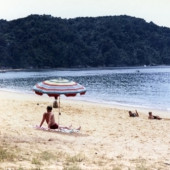Our website uses cookies so we can analyse our site usage and give you the best experience. Click "Accept" if you’re happy with this, or click "More" for information about cookies on our site, how to opt out, and how to disable cookies altogether.
We respect your Do Not Track preference.

As the working year gets underway, I’m holding on to that summer feeling of long hot days by the beach, walks in the bush, swims in the river, kayaking in the surf and enjoying fresh fish and new season corn for dinner. Far from city life, with few people around and everyone pretty relaxed, you could be forgiven for thinking you don’t need to worry about your privacy, especially privacy online.
Being away from a city routine is one of the joys of a New Zealand summer, but if you want to protect the privacy of your holiday, then thinking about connectivity, trust and security are still important.
Living in a major centre like Wellington, it’s easy to take connectivity for granted. But travelling State Highway 35 on the North Island’s East Coast it’s clear that Internet connectivity remains a significant issue in regional New Zealand. The roll out of rural broadband will continue in 2016 and there are new resources to help understand whether there is broadband in your area.
For those living without access to broadband or other telecommunications networks (and travellers to those areas) Internet connectivity is dependent on others, including public libraries, café owners, camping grounds, motels and restaurants. That dependence creates all sorts of fun issues. What? No eftpos? No credit card? Cash only transactions? Honesty boxes for the campground?
That dependency also creates privacy issues, including trust and security. You want to upload those holiday photos to your social media accounts - but can you be sure that provider’s wifi connection is secure? What logs of information are kept and who has access to them? How many devices can be connected and are there any content restrictions?
Many accommodation providers do offer travellers secure, password-protected wifi and it pays to check out if the place you’re staying at is one of them. Even if you do not want to be online - you’re on holiday after all - other travellers might be sharing information about you, whether you know it or not. So think about your social media habits and how you share those summer holiday photos. Respect the privacy of people who don’t want to be in your shot.
When you’re reliant on someone else to get back on the grid, trust is really important and can come in unusual forms. For example, at the Anaura Bay Family Motor Camp, Victor and Dona have a password-protected wifi login available to campers only. There’s no need to worry about having to trust the local campers to not covertly Bluetooth or hotspot off your device because they have their own access.
Trust is also important when your device’s battery runs out. Will someone take a look at your stuff while you leave it unattended? Do you need to log out of all those online accounts, just in case? Again, Dona had a simple system. Their policy is no charging your device in the communal kitchen (hogging the kitchen’s electrical sockets for charging phones, cameras, and tablets is socially unacceptable anyway!). Instead, she asks that you hand in your device and she will plug it into one of the various electrical multi-boxes in her kitchen or lounge. It is returned on request, fully charged at no extra cost.
In 2016, trust and security will continue to be issues for those interested in privacy. In the meantime, we can all take steps to ensure our security too (using simple password protection on our devices, virtual proxy networks and encryption). That will certainly help you hold on to that summer feeling, whether on holiday or back at work.
Image credit: Masterton District Library and Archive
Back